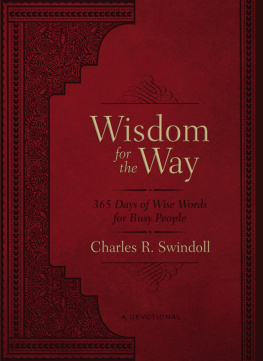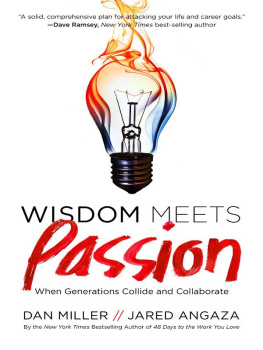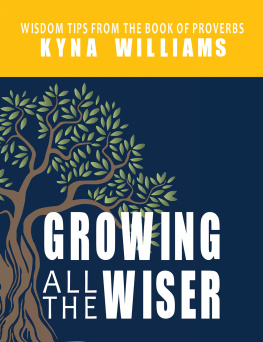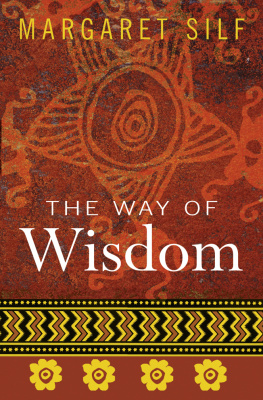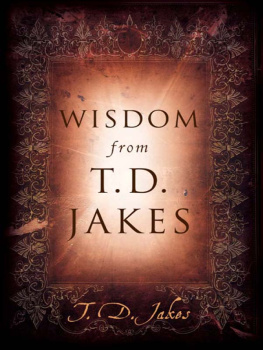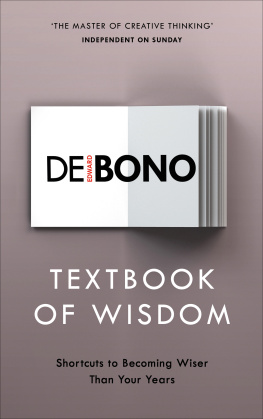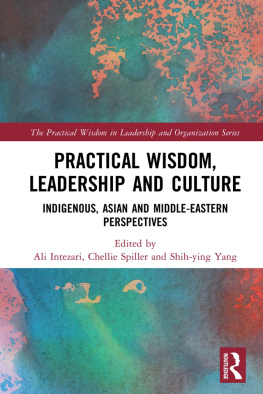TOWARD
WISDOM
Copthorne Macdonald
TOWARD
WISDOM
Finding Our Way to Inner Peace,
Love & Happiness

Toward Wisdom
Finding Our Way to Inner Peace, Love and Happiness
Copyright 1993 by Copthorne Macdonald
All Rights Reserved.
ISBN 0-88882-151-4
Publisher: Anthony Hawke
Editor: Shirley Knight Morris
Designer: Gerard Williams
Compositor: Robin Brass Studio
Printer: Best Gagn Book Manufacturers Inc.
Publication was assisted by
the Canada Council,
the Ontario Arts Council
and the Ontario Ministry of
Culture and Communications.
Hounslow Press
A Division of Anthony R. Hawke Limited
124 Parkview Avenue
Willowdale, Ontario, Canada
M2N 3Y5
Printed and bound in Canada
To all those positive influences along the way
especially the first, Jane Copthorne Macdonald
Contents
Acknowledgements
Open Focus is a registered trademark of Biofeedback Computers Inc., Princeton New Jersey
The following source materials are gratefully acknowledged:
The Kenneth Rexroth quotes are from his article William Golding, The Atlantic Monthly, Volume 215, No. 5, May, 1965.
The characteristics of self-actualizing people are from Abraham Maslow, Toward a Psychology of Being, Second Edition, New York: Van Nostrand Reinhold, 1968, p. 83.
Gregory Batesons definition of information is from his book Steps to an Ecology of Mind, New York: Ballantine Books, 1972, p. 453.
Melvin Konner passages are from The Tangled Wing, New York: Holt, Rinehart & Winston, 1982.
The words of Albert Einstein are quoted in Joseph Goldstein, The Experience of Insight: A Natural Unfolding Unity Press, Santa Cruz, 1976, p. 126.
The Alan Watts quotes in Chapters 4 and 7 are from The Book: On the Taboo Against Knowing Who You Are, New York: Vintage Press I Random House, 1972, pp. 8, 69.
Paul MacLeans comments appear in his paper On the Evolution of Three Mentalities, New Dimensions in Psychiatry: A World, View, Vol. 2, edited by Dr. Silvano Arieti and Dr. Gerard Chzanowki. New York: John Wiley and Sons, 1977, p. 325.
The Edward T. Hall passage from his book Beyond Culture is reproduced by permission of Bantam Doubleday Dell Publishing Group.
The Dalai Lama quotes are from Catherine Ingrams interview, The Dalai Lama in Depth, Yoga Journal, Issue 90, Jan/Feb 1990.
Joseph Campbell passages are from The Hero With a Thousand Faces, Bollingen Series XVII. Copyright 1949 renewed by Princeton University Press. Used with permission
Passages from I AM THAT are reproduced by permission of Chetana Pvt. Ltd., Bombay, India.
The Gail Sheehy quote is from her book Passages, New York: E.P. Dutton, 1974, 1976, p. 242.
The Aldous Huxley passage is from The Perennial Philosophy, London: Chatto & Windus, 1969, p. 38.
The definition of Open Focus is from the Study Guide: Open Focus Cassette Training Series, Basic 1000, Princeton, NJ: Biofeedback Computers, 1977.
Alan Watts quotes Oscar Wilde in The Meaning of Happiness: The Quest for Freedom of the Spirit in Modern Psychology and the Wisdom of the East, New York: Harper Colophon Books, 1969 (1940), p. 40
Da Free Johns comments are from The Bodily Location of Happiness, Clearlake, CA: Dawn Horse Press, 1982.
The E.F. Schumacher quote is from A Guide for the Perplexed. New York: Harper and Row. 1977. p. 39
Edward Hoffman quotes Abraham Maslow in The Right to be Human: A Biography of Abraham Maslow, Los Angeles: Jeremy P. Tarcher, 1988, p. 298.
The T. S. Eliot line is from his poem Burnt Norton, Four Quartets, London: Faber and Faber, 1959 (1944), p. 15.
The Tony Bastick quote is from his book Intuition: How We Think and Act, Chichester: John Wiley & Sons, 1982, p. 277.
The Virginia Burden Tower quote is from her book The Process of Intuition, 2nd Ed., Wheaton, Ill.: The Theosophical Publishing House, 1987, p. 83.
Philip Goldberg passages are from The Intuitive Edge, Los Angeles: Jeremy P. Tarcher, Inc., 1983.
The Hazel Barnes quote is from her book Humanistic Existentialism.
The Arthur Koestler quote is from his book The Act of Creation, New York: Dell Publishing Co., 1964, 1967, p. 633.
The Goethe quote is from Goethes World View, Ed. by Frederick Unger, Tr. by Heinz Norden, New York: Frederick Unger Publishing Co., 1963, p. 141.
The Ranier Maria Rilke quote is from Letters to a Young Poet, New York: W.W. Norton, 1934, 1954, 1962, p. 59.
The list of Vipassana sitting groups is from Inquiring Mind: A Semiannual Journal of the Vipassana Community.
Preface
This book is about wisdom and the process of becoming wise. It has its roots in two major turning points in my life. The first dates back 25 years, to a time when I was just leaving my 20s and entering my 30s. I was, in those days, a corporate design engineer and engineering manager with a very narrow outlook on life. I cringe as I recall my self-assured smugness, the absolute confidence I had that technology was the centre of all that mattered. I saw everything else as some kind of frill, as some variety of missing the mark. Kenneth Rexroth recognized me and my kind; he called us the technical intelligentsia. He also called us Neanderthals with slide rules.
A corporate management seminar was the unlikely place where the first seeds of change were planted. It was there that I was introduced to Abraham Maslows theory of motivation and psychological growth. I found Maslows concept of self-actualization exciting, and for the next decade the idea of becoming all Im capable of becoming was the focus of my life.
I spent that decade, my 30s, discovering, adventuring, and watching my outlook broaden. I began with a year of intensive reading (Camus, Sartre, Kazantzakis, Hesse, Maslow, and others) and then began a series of outward-oriented adventures. Electronic art was the first exploration; that was followed by three years in Manhattan as Director of Research for a small electronics company. Next came a 13-month backpack trip around the world. During that trip the foreignness of other places and people vanished, and I developed concerns about third world problems and the well-being of our planet. These concerns led to involvement in the alternatives movement of the 70s, writing magazine articles and columns, and changing countries. At the end of the decade I heeded the advice of both feminism and brain-hemisphere theory and took steps to develop the nurturing side of myself. I worked awhile as a hospital orderly, and then with the elderly.
The second turning point came at age 41 when I attended a 12-day meditation retreat and my mind became still and quiet for the first time in my adult life. When I left that retreat the world was the same old world, but my way of looking at it had changed profoundly. I had begun an inward-oriented adventure. The investigation prompted by that first retreat occupied much of the next 15 years and still continues. During those years I read hundreds of books and scientific articles, and spent several thousand hours doing various types of meditative practice. The goal of both endeavors was to arrive at satisfying answers to some fundamental questions: What is going on? Whats it all about? and What am I to do about it? The search was always for explanations that rang true both intuitively and intellectually. In a sense, this book is a status report on the investigation to date.
Next page

